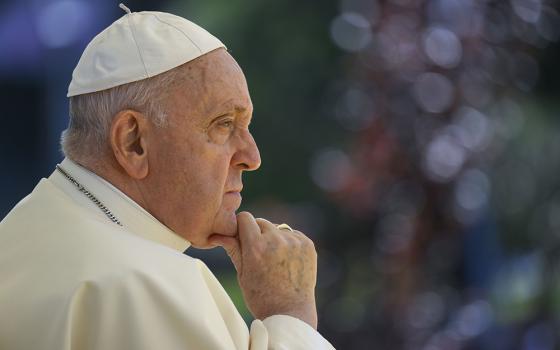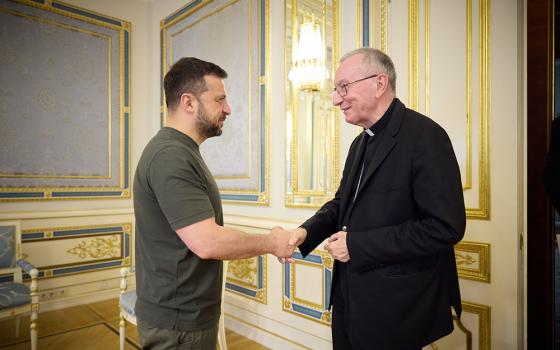It would have been easy to spend the entire last week, since the release of Laudato Si’, doing nothing on this blog put play whack-a-mole, hitting the various detractors as they pop up their little heads. Most of the objections so far have been predictable and not worth the effort. But, two dissenters have come to my attention that warrant a response, one because the dissent is both incendiary and dumb, the other because the dissent is unintentionally on-target and smart.
Writing in the Federalist, D.C. McAllister criticizes Pope Francis not because he is wrong on the science, or the economics, or the politics, of environmental issues, although she posits that he is. Her criticism is that he gets the theology wrong, that his claim that the poor are at the heart of the Gospel entails a misunderstanding about the difference between spiritual poverty and material poverty, and, consequently displaces what she believes is the heart of the Gospel, faith alone in Jesus Christ.
Should we tell her that Pope Francis is not a Lutheran? Nah. That would seem to indict Lutherans, What is funny is that her understanding of Luther’s doctrine of justification by faith alone has all the sophistication of a sixteenth century polemic. She quotes Luther, but she does not understand him, except in the coarsest of ways.
Should we tell her about the Catholic-Lutheran dialogue which produced, in 1999, a Joint Declaration on the Doctrine of Justification, removing the mutual anathemas hurled at each other in the sixteenth century? That both the Catholic Church and the Lutheran Church understand that love, including especially love for the poor, active love, is an essential part of faith? We could throw a few quotes from the Epistle of James at her, but that, too, would have a sixteenth century feel to it.
I have never before read an article by McAllister. Her bio makes her sound like a veritable Renaissance woman. She is a journalist, an “Expressionist artist and musician,” and she studied some theology along the way. I am no fan of specialization and normally warm to the insights of someone with such a varied resume. Alas. In his great essay on Tolstoy, “The Hedgehog and the Fox,” Isaiah Berlin based his study on a fragment of a poem by Aeschylus, which stated: “The fox knows many things. The hedgehog knows one big thing.” Berlin posited that these poles represented essentially two casts of mind by which we can classify the great Western minds. Plato? Hedgehog. Aristotle? Fox. Augustine? Hedgehog. Shakespeare? Fox. The burden of his essay was that Tolstoy was a fox who wanted to be a hedgehog. It is a delightful read. A person with a varied resume usually tends to be someone who is a fox. But, McAllister is a hedgehog. She knows one big thing and that thing is wrong.
David Brooks' essay in the New York Times is very different. My friend Anthony Annett has done much of the heavy lifting in rebutting Brooks at Commonweal. But, I will grant that Brooks is on to something. Yes, he repeats the mantra about capitalism lifting millions out of poverty a little too superficially, as if nothing else but capitalism has contributed to the alleviation of poverty. And, he notes that the self-interest of capitalism often generates new discoveries and innovations that help everyone, as if there was no creativity in the age of monarchs or before Adam Smith set quill to scroll. Still, Brooks is right to note that modernity’s fundamental project, and justification for both markets and for modern democracy, is that self-interest is a given in human nature and can be harnessed in such a way as to achieve mutual benefit. The problem is that self-interest is not a Christian virtue. As Christians, we believe concupiscence, in all its varied splendor, leads the soul astray and sometimes lead whole societies astray, that the desire for stuff cannot cohere with the life-for-others to which Christians are called. Or, as David Schindler once put it, “a selfishness become mutual is not yet mutual generosity.”
This has implications for the Church’s discussion of religious liberty. John Courtney Murray was a great thinker, but even he knew that he had not squared the circle, had not found the key to uniting a modern understanding of liberty, which is usually a negative conception of liberty, or freedom from, with a Christian understanding of liberty, which must always be a positive conception, a freedom for. At the level of theory, I suspect they cannot be reconciled, which is one reason Pope Francis’ text strikes so many Americans as wrong-headed. Does not the poor benighted Argentine understand how wonderful we are?
My view of the market is akin to Churchill’s view of democracy. It is the worst system in the history of the world except for every other system. I hold no grudge against a mom-and-pop shop trying to earn a living. But, modern capitalism is not in any meaningful way a free market, and I do not refer to the restraints of government regulation in the manner of a libertarian. It seems obvious to me that government regulations of the market are usually an expression of the common good over against the moneyed interest. But, in our day, the money seems to win more than the common good. Certainly, the trade pacts with Asia that now seem likely after Congress voted to give the president fast-track trade authority will give the rich and the powerful ample means for ensuring their interests but the workers, and the earth, do not have the juice that the plutocrats do and their interests will go by the wayside. I have no magic replacement for markets – or for democracy. But, I welcome restraints upon their self-destructive tendencies which are always easily identifiable by the way those tendencies accrue power to the few and misery to the many. And, while we can live with this system in the absence of something better, we should not idolize it, but recognize its horribleness and take steps to ameliorate the damage.
Pope Francis looks at the economy and the ecology of the world from the bottom up. That is undoubtedly how Jesus looked at it: The last will be first, and the first last. Jesus announced his ministry in Luke 4 by quoting Isaiah, that He had come to bring good news to the poor, not to the rich. In our world today, in which the rich feel inconvenienced if their private planes are not on time, and millions go to bed hungry, in which large multinationals deposit their industrial waste in the lands of people too poor to resist and the poor live with the ugly consequences, it is time to start looking at the world from the bottom up. It sure looks different than the self-congratulatory tone Brooks evidences.




